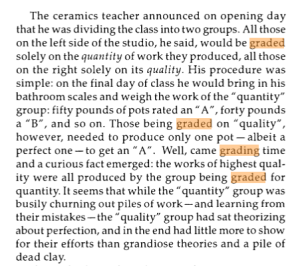
For a child who has a musical skill as part of a core long-term talent that is developing, you can still turn your normal history curriculum into a curriculum that supports your child’s talent growth. One way to do that is that is to have your child write new song lyrics to fit an existing modern song at the end of each and every history lesson that your son or daughter finishes.
The objective is twofold. The first objective is that by constant and consistent production of lyrics, your child will force himself to daily keep producing as fast as possible new lyrics in order to keep up with the lessons. The history content of the lesson is the fodder and message that your child is able to use immediately so he can focus exclusively on lyric composition.
The second objective is that by wrestling with creating new lyrics every day, your child will easily assimilate the meaning he believes the history lesson is trying to convey. This wrestling with the content will peg the purely historical information onto his growing song writing abilities and lock it into his mind permanently. He will remember history better than if had just studied and answered the standard curriculum questions directly.
Here is a link on how your child can get started writing lyrics today with intro, verse, bridge, and chorus words:
http://www.wikihow.com/Write-a-Song





























